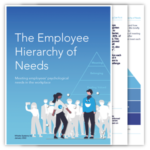Employee Loyalty Leaders
Interviews with HR Leaders Building Exceptional Employee Experiences
Interviews with HR Leaders Building Exceptional Employee Experiences
When employees feel like they are the top priority, it makes them feel appreciated and valued. This leads to a more productive and engaged workforce
As companies look ahead, there’s no disputing the pandemic has fundamentally changed the way people work. This shift impacts some industries more than others, but employees of all kinds have different needs that employers will need to address — or risk losing top talent.
In this interview series, we’re talking to HR leaders to get their insights and stories about how companies can improve the employee experience.
Jen Patterson is an experienced HR leader and business consultant in the Human Resources industry for 20+ years. From talent development to executive leadership, Jen has experience creating workplace cultures centered on putting people first, working with clients to identify gaps in their HR programs, and creating talent and succession planning and retention strategies.
In your opinion, what is the most important responsibility of an HR department?
When it comes to the most important responsibilities of HR, supporting employees is at the top of the list. This means ensuring they have everything they need to succeed in their professional and personal lives. It can be challenging to balance company policies and procedures with the needs of employees, but it is crucial to do so for your team to be productive and happy.
With all the information in the news about The Great Resignation, what do you think hiring managers really need to understand?
When it comes to talent retention and attraction, the most important thing for hiring managers to understand is what motivates their employees. What are the things that make them want to stay with your company? What are the things that would make them leave? Once you understand what motivates your employees, you can start to put together a plan for retaining and attracting them.
One of the most important things to remember regarding talent retention and attraction is that your employees are not just looking for a paycheck. They are looking for a place where they can grow and develop their skills. They want to work somewhere that values their contributions and where they feel like they are part of a team. If you can create this environment, you will be on your way to retaining and attracting great talent!
Here are a few tips for putting these concepts into practice:
- Make sure you are clear about your company’s values and mission. Your employees need to know what they are working towards and why it is essential.
- Create opportunities for your employees to grow and develop their skills. This could include things like training programs or mentorship programs.
- Make sure you regularly communicate with your employees about their career goals and how they can achieve them.
- Encourage your employees to give feedback about their experience working for your company. This will help you identify areas where you can improve.
What is one thing HR leaders can do differently that will have the biggest positive impact on employee morale?
The answer is simple: focus on communication. Communication is key in any relationship, and the employer-employee relationship is no different. When employees feel like they are being kept in the dark, it leads to frustration and a feeling of being unvalued. On the other hand, clear and consistent communication from HR leaders goes a long way in making employees feel appreciated and valued.
If you want to improve employee morale at your company, start by focusing on communication. Let your employees know what is going on in the company, share your plans for the future, and give them regular feedback. Doing these things will show your employees that you value their input and are committed to making the workplace a happy and productive environment!
What tips or examples do you have on ways companies can show employee appreciation?
It may sound simple, but one of the most important things you can do to show your employees that you appreciate them is simply saying “thank you.” A simple “thank you” can go a long way in making an employee feel appreciated. You can also show appreciation by giving employees small gifts or bonuses, such as a gift card to a local restaurant or store. Another great way to show appreciation is to offer employees flexible work hours or the ability to telecommute occasionally. This gives employees more control over their work/life balance, which can be a huge perk.
How important is new employee onboarding, and what tips or guidance would you share that have been successful for you?
Onboarding new employees is one of the most important aspects of any business. It is essential because it helps set the tone for the rest of their employment.
A successful onboarding program will help new employees feel welcomed, appreciated, and part of the team from day one. It will also ensure they have the tools and knowledge they need to succeed in their new role.
One of the most important things to do when onboarding a new employee is to set expectations. You should tell them what the company culture is like and their role within the company. It is also essential to give them a realistic idea of what they can expect in their first few weeks and months on the job. This will help them feel more comfortable transitioning into their new position.
Another tip for successful onboarding is to provide adequate training. This may seem like an obvious one, but it is often overlooked. Ensure your new employee has all the tools and resources they need to succeed in their role. Provide them with a clear understanding of your company’s procedures and policies so that they can hit the ground running.
Finally, one of the most important things you can do to ensure successful onboarding is create a supportive environment. This means having a team of people willing to help your new employee adjust to their new role. Be available to answer any questions they may have and provide feedback on their progress. Creating a supportive environment will help your new employee feel more comfortable and confident in their new position.
What are the biggest opportunities and/or pitfalls companies face when it comes to training and development? Any ideal solutions?
One of the biggest challenges companies face regarding training and development is finding the right balance between employee needs and company objectives. Finding a training program that meets the needs of both the employees and the company can be challenging, but it is important to find this balance to succeed.
Another common challenge companies face is ensuring employees are engaged in the training process. It can be easy for employees to tune out or become disengaged during a training session, so it is essential to make sure that they are actively involved in the learning process. There are a few ways to do this, such as using interactive exercises or games, providing opportunities for hands-on learning, or incorporating team-building activities into the training.
Finally, one of the companies’ biggest pitfalls is not following through with the training after it is complete. It is important to ensure that employees can apply what they have learned in their everyday work lives and that they are given opportunities to continue learning and developing their skills.
If you could encourage your peers to address one thing within their organization to positively impact the employee experience, what would you suggest and why?
Many things go into creating a positive employee experience, but one thing you can address today is leading with a people-first mindset. When employees feel like they are the top priority, it makes them feel appreciated and valued. This leads to a more productive and engaged workforce.
There are many benefits to having a people-first mindset, but the most important one is that it leads to a more positive employee experience. Creating a positive employee experience should be a top priority for any organization because it leads to better employee retention and engagement.
If you want to ensure your employees are happy and productive, start by leading with a people-first mindset.
Patterson Consulting Group (PCG) is a boutique consulting firm that helps companies create and implement successful change. They take the time to get to know your company, identify what needs fixing, and then develop a strategy for improvement. Whether it’s an overall organizational restructuring or just one specific problem, PCG can help improve communication across departments, raise employee morale and retention rates, increase productivity — all while harnessing your company’s full potential.
Sign up now to receive monthly updates from Whistle including more interviews with HR leaders sharing their thoughts on employee loyalty, culture and experience.

 The Employee Hierarchy of Needs
The Employee Hierarchy of Needs